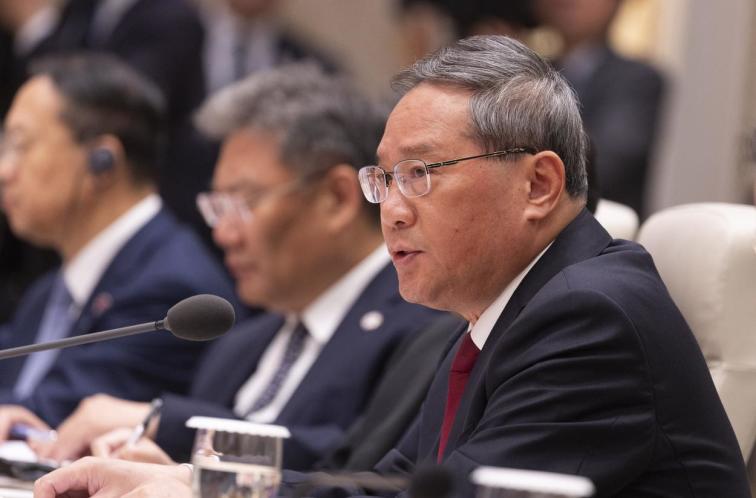On March 8, 2024, military representatives attending the National People's Congress of the Chinese Communist Party (CCP) arrived outside the Great Hall of the People in Beijing. (Kevin Frayer/Getty Images)
[People News] Today (July 15), the People's Daily announced that the Central Urban Work Conference of the Communist Party of China took place in Beijing. All seven members of the Communist Party's Standing Committee, Central Committee members, State Councillors, heads of various central agencies and departments, as well as local officials, were in attendance. Historically, the Communist Party has convened a Central Urban Work Conference only four times before, making this the fifth occurrence. The high profile of this meeting has led many to speculate that something significant is unfolding in China.
Reports indicate that the Central Urban Work Conference was held from July 14 to 15 in Beijing. Xi Jinping attended the meeting and delivered an important speech. Standing Committee members Li Qiang, Zhao Leji, Wang Huning, Cai Qi, Ding Xuexiang, and Li Xi were present. The main leaders from relevant departments of the Central Committee, local officials at the prefecture level and above, and key figures from relevant departments of the Central Military Commission also participated. Notably, Military Commission Vice Chairman He Weidong was absent, which seems to confirm ongoing rumours regarding his situation.
The meeting outlined seven key tasks and set specific goals for urban development, emphasising the creation of modern, livable, and innovative cities.
Observers have noted the exceptionally high standards of this Central Urban Work Conference.
In his program "Tianliang Lunzheng," Professor Zhang Tianliang from Feitian University analysed that some very subtle political signals are being conveyed. The first of these is Xi Jinping's assertion of his own power. In theory, urban work pertains to economic issues and should be overseen by the State Council. The military has no relevance to housing construction. Additionally, central ministries that are not related to housing construction were not originally required to attend. However, Xi Jinping called all these officials to a meeting to signal to the outside world that economic matters are still under his control, while Li Qiang plays a merely supportive role.
Historically, the Chinese Communist Party has held four urban work conferences.
The first and second national urban work conferences were held in September 1962 and October 1963, respectively. These conferences primarily aimed to clarify the fundamental understanding of urban issues.
In March 1978, the State Council convened the third national urban work conference in Beijing, where opinions on strengthening urban construction were formulated. At that time, the backdrop was the significant increase in the number of towns in China due to reforms in the rural and urban economic systems, marking a new phase in urban development. One of the main objectives of that conference was to discuss the sources of funding for urban construction.
On December 20, 2015, the CCP convened the fourth central urban work conference, 37 years after the last one.
Now, the fifth central urban work conference has been held again after a 10-year interval.
Zhang Tianliang believes that Xi Jinping called this meeting because China's real estate market has reached a critical point where intervention is necessary to prevent further decline.
Data released by the National Bureau of Statistics of the Communist Party of China on July 15 indicates that new home prices in 70 major cities fell by 0.27% in June compared to May, representing the largest decline in eight months. Meanwhile, second-hand residential (used housing) prices dropped by 0.61% month-on-month, the most significant decrease since September of last year. Since the start of this year, housing prices have decreased by 4.7% compared to the same period last year, as developers continue to grapple with excess housing inventory and substantial debt burdens.
Additional data related to the housing market released by the National Bureau of Statistics has also contributed to market frustration. In June, new residential sales saw a year-on-year decrease of 12.6%, marking the largest decline this year. Over the first six months of this year, new residential sales fell by 5.2%, a drop that exceeds the 2.8% decline recorded in the previous five months. Furthermore, real estate investment during the first half of this year decreased by 11.2% year-on-year, the largest drop since the pandemic began, and also greater than the 10.7% decline seen in the previous five months.
Zhang Tianliang noted that China's real estate market is currently undergoing a collapse, with prices in many regions having already fallen by 50%. What does this signify? It indicates that the properties owned by Chinese citizens are essentially worth less than their debts.
Zhang Tianliang anticipates that Xi Jinping may initiate a new round of market rescue plans, although specific measures have yet to be revealed.
According to a report by Bloomberg, analysts Liu Jieqi and Damon Shen from Dahua Jixian highlighted in their report: "The June data clearly shows that the housing market is weak, and we expect a higher likelihood of policy support measures being announced at the July meeting of the Central Political Bureau of the Communist Party of China."
In June, another company in China's real estate sector found itself in financial trouble. Hong Long China Real Estate Group Co., Ltd. (Hong Long China), which was once ranked among China's top 100 real estate firms, announced that due to a liquidity crisis, it is anticipated that it will be unable to pay $8.576 million in interest before the grace period expires, thereby triggering a debt default.△











News magazine bootstrap themes!
I like this themes, fast loading and look profesional
Thank you Carlos!
You're welcome!
Please support me with give positive rating!
Yes Sure!